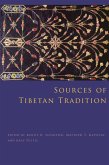The Tarikh-i ¿amidi is an epic and tragic history from the region of Xinjiang in northwest China, the homeland of the Muslim-majority Uyghur people. Written in the early twentieth century, it chronicles a mass rebellion by the Muslims of Xinjiang against the China-based Qing empire from its beginnings in 1864 to the Qing reconquest of 1877 and its aftermath. Its author, Musa Sayrami, was an eyewitness to and participant in the rebellion, and he later became a servant to the state that arose from it: an emirate led by the Central Asian military commander Yäqub Beg.
Sayrami documents the optimism of the rebellion's early days, when local Muslims rose up to demand justice, as well as the tragedies that resulted from its leaders' hubris. Yäqub Beg's state offered hope for Islamic rule, but he turned out to be a flawed ruler, and the Qing reconquered the region. The narrative alternates dramatic scenes of battles and intrigue with colorful legends and reflections on the nature of politics.
Sayrami wrote not only to record events being lost from memory three decades after the uprising but also to account for why the Islamic rebellion had failed. He draws on traditional Islamic scholarship to analyze the relationship between Qing and Islamic power, developing an incisive argument about politics and empire. Presenting a distinctly Uyghur perspective on China, Eurasia, and the world, the Tarikh-i ¿amidi is at once an invaluable lens on a period of flux and a cornerstone of Uyghur writing.
Sayrami documents the optimism of the rebellion's early days, when local Muslims rose up to demand justice, as well as the tragedies that resulted from its leaders' hubris. Yäqub Beg's state offered hope for Islamic rule, but he turned out to be a flawed ruler, and the Qing reconquered the region. The narrative alternates dramatic scenes of battles and intrigue with colorful legends and reflections on the nature of politics.
Sayrami wrote not only to record events being lost from memory three decades after the uprising but also to account for why the Islamic rebellion had failed. He draws on traditional Islamic scholarship to analyze the relationship between Qing and Islamic power, developing an incisive argument about politics and empire. Presenting a distinctly Uyghur perspective on China, Eurasia, and the world, the Tarikh-i ¿amidi is at once an invaluable lens on a period of flux and a cornerstone of Uyghur writing.
Dieser Download kann aus rechtlichen Gründen nur mit Rechnungsadresse in A, D ausgeliefert werden.









